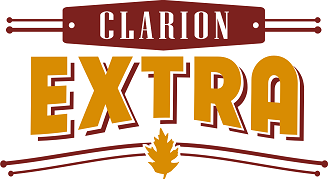By RODNEY L. SHERMAN
Clarion News editor
No, Clarion Borough is not setting out to tax property owners in the borough for the rain and snow that falls on their land.
No, the revenue generated by a proposed stormwater runoff fee would not go into council members’ pockets.
Yes, Clarion University of Pennsylvania, churches, public schools and other tax-exempt properties could be subject to the fee – tax-exempt properties are not necessarily fee-exempt.
From that information, civil engineers HRG Inc. will develop a formula to determine the stormwater runoff fee for each property.
The fee would be calculated through a formula that takes into account how much permeable area there is versus how much impermeable – or “impervious” – area there is on a piece of property.
The formula will look at how big a building’s roof is and how much pavement is on a piece of property compared with how much yard or gravel parking space is on a piece of property.
Yard or gravel area are considered permeable, and thus storm water goes into the ground and not into the storm-sewer system.
The money generated by the fee will be dedicated to repairs and maintenance of the borough’s aging stormwater drainage system.
Clarion Borough Council President Carol Lapinto said the borough’s general fund cannot keep up with costs of repairing the stormwater system.
“Center Place is an example,” Lapinto said. “That system needs to be replaced and we’re looking at $500,000 for that.”
“This fee would offset a substantial tax increase on the people who are already carrying the entire tax burden,” Lapinto said.
“We have so much of the system that is collapsing or has had holes punched in it. Right now, all our public works crew can do is be reactive. We don’t have the money to be proactive. We don’t have the proper safety equipment for the guys to get down and work in the holes. We don’t have the right equipment to do the work.”
Two years ago, then-Clarion Borough Manager Mark Hall said the system’s pipes are galvanized steel or terracotta and have served their useful life.
The galvanized pipe and terracotta pipe are to the point now where they are too old and are beginning to collapse.
The problem the borough faces is how to pay to fix the collapsing storm sewer pipes. Another problem is when storm sewer pipe collapses, any pavement above the pipe also collapses.
The projected cost to replace the borough’s storm sewer pipes was estimated then to be around $10 million over the next five years or so.
The cost
Lapinto said she has heard estimates around $35 per month and lower.
The fee would be determined by financial need and the total square footage of “impervious” areas.
When the proposal for a fee first surfaced, Hall considered an engineering “flyover” to photograph and analyze roofs, parking lots, driveways, sidewalks and other areas where rain and snow-melt cannot soak into the ground but instead is forced into stormwater sewers.
But the cost of that service was expected to be at least $20,000 – money needed upfront and money the borough doesn’t have.
Lapinto said conversations with White Township officials near Indiana University of Pennsylvania led to the idea to survey property owners.
There could be some problems, Lapinto acknowledged, for people unable to measure their “impervious” areas.
Also, there is no legal requirement pushing property owners to fill out and return the survey.
“We’re all in this together, so we hope people will fill out the survey and send it back.”

